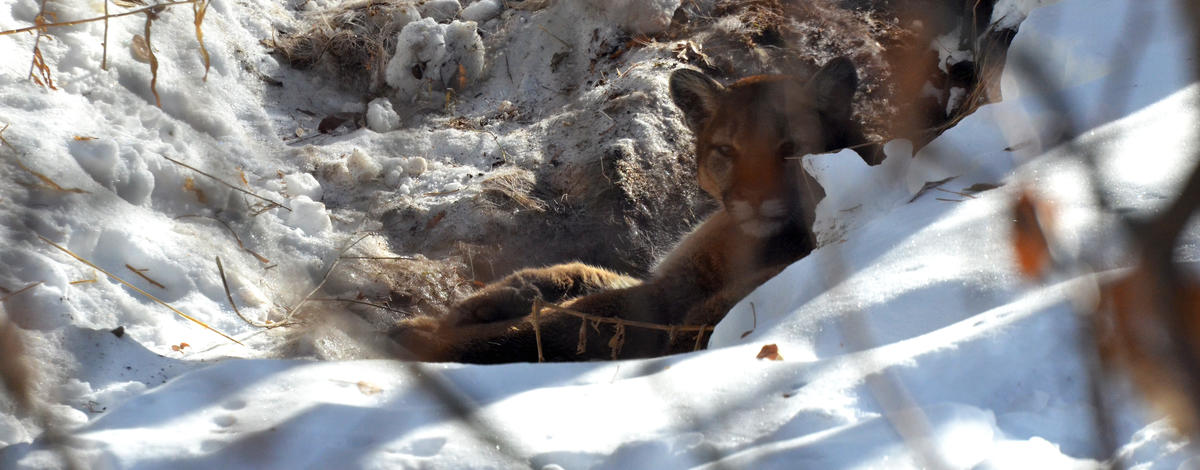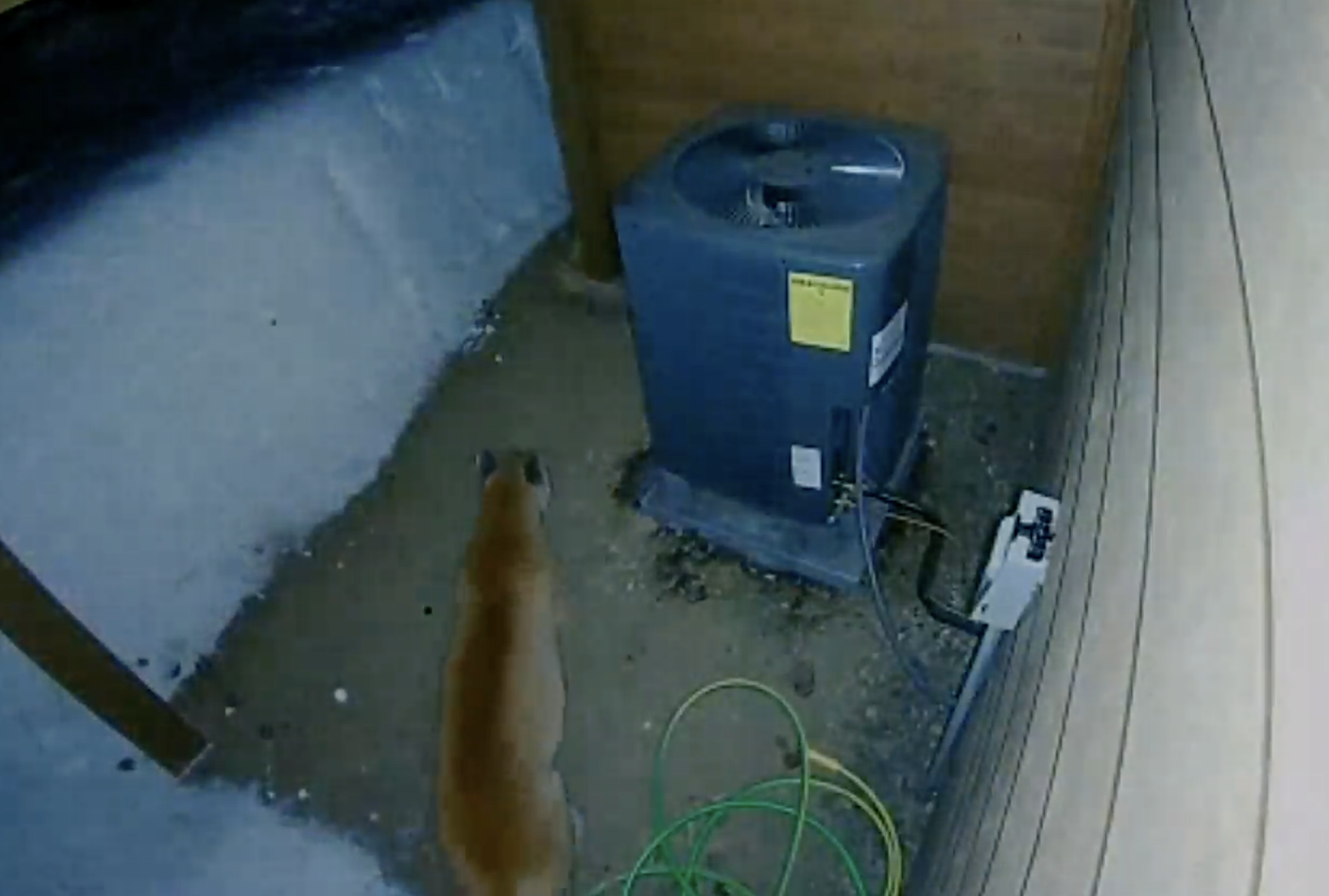Mountain lions have been seen and reported in McCall in recent months, and Fish and Game wildlife biologists believe the lions will stick around into spring. Understandably, lions close to homes has generated questions about potential risks to public safety, and whether – or how – Fish and Game intends to deal with lions in town.

F&G continues to monitor mountain lion activity in McCall
Fish and Game staff have neither observed nor received reports of lion behavior that would indicate an imminent public safety risk, but residents should be vigilant and continue to report sightings
In terms of public safety, Fish and Game wildlife staff have neither observed nor received reports of mountain lion behavior that would indicate an imminent public safety risk. The mountain lions are avoiding humans and pets while preying on an abundant and natural food source in the town’s deer herd. In a word, the mountain lions’ behavior so far has been typical.
That said, residents should always remain vigilant to wildlife that may be near their homes, such as mountain lions or black bears, and even elk and deer. All wild animals can become aggressive for a variety of reasons, including protection of young.
It’s also crucial that residents continue to report mountain lion sightings, as well as any encounters or missing pets, to McCall Fish and Game staff so they can continue to monitor the behavior of the lions and assess potential risks to public safety.
“Any time we have mountain lions in close proximity to people, our primary concern is for public safety,” said Fish and Game Regional Supervisor Josh Royse. “Our level of concern rises when lions start to exhibit nontypical behavior, such as being active in the middle of the day and losing their fear of humans, or preying on domestic pets, which is why continuing to receive reports from the public is so important.”
F&G’s options for addressing habituated mountain lions are limited
What are Fish and Game’s options if mountain lions start exhibiting nontypical behavior? There are a few, but one that won’t be considered is capturing and relocating them. Fish and Game generally does not relocate large carnivores, including mountain lions and black bears, for several reasons.
The most likely outcomes when relocating a habituated large carnivore are all negative, such as: it returns to the area where it was trapped; it is killed in a territorial dispute or by a dominant animal already occupying that space; it starves; or it resumes the same nontypical behavior in a new location. Rarely does a problem lion resume what we would consider normal behavior.

There are also challenges specific to attempting to relocate family groups, like the mountain lions currently residing around McCall. Family groups typically cannot successfully be relocated because it is highly unlikely wildlife staff could catch all of them at the same time. This means Fish and Game would be separating young mountain lions from their mother, which would leave them without adult guidance and likely result in more problematic behavior.
Nonlethal hazing can be an effective tool, but only in the right circumstances
Another option is hazing the mountain lions through nonlethal means, which helps reinforce a healthy fear of humans and encourages them to move out of a specific area.
However, those decisions need to be made on a case-by-case basis, after evaluating potential pros and cons, such as where the cat might move after being hazed, and whether that new location is better or worse than where it is now.
These may be “on-the-spot” decisions where Fish and Game officials must decide what to do in minutes, and public safety will always weigh heavily in their decision.
Ultimately, when lions have become a public safety issue, the most humane and responsible option is often to euthanize it, but that isn’t a decision that Fish and Game staff takes lightly.
“As wildlife biologists, we are dedicated to managing healthy and robust wildlife populations, and the last thing we want to do is euthanize an animal,” McCall Regional Wildlife Manager Regan Berkley said. “That’s why we focus so much energy into informing and educating the public, and place such an emphasis on keeping wildlife wild.”

Fish and Game has received well over 50 reports, videos and photos of the three to five mountain lions in the McCall area this winter. These reports have given wildlife managers an idea of mountain lion behavior in town, and so far, those cats are exhibiting fairly normal behavior.
“We absolutely do not want to euthanize mountain lions in and around McCall, or anywhere for that matter,” Royse added. “Lethal removal is the last resort, and none of us like that outcome. At the moment, we have not deemed them to be an imminent threat to the public, which is why we’ve not been forced to euthanize any mountain lions in the area.”
Keep wildlife wild, and don’t create, or contribute to a larger problem
Mountain lions are in McCall during winter because they have an abundant and reliable food source, which is a large herd of town deer that have become accustomed to handouts, particularly during winter when their wilder cousins have migrated to lower elevations.
“Frankly, these mountain lions are here because the deer are here, and the deer are here at least in part, because they have been fed for years by humans,” Royse said.
This is one of the many reasons that Idaho Fish and Game continually recommends against private feeding of deer and elk. Artificially altering wildlife’s behavior almost always produces unintended and often negative consequences.
“Keeping all wildlife wild is the responsibility of all of us as humans living in wildlife habitat,” Berkley added. “But when we collectively fail at that, and wildlife begins to exhibit aggressive or unnatural behavior, it is our responsibility as wildlife professionals to make difficult decisions in the interest of public safety.”
Here's what McCall residents can do to help keep mountain lions wild around McCall, and prevent Fish and Game from having to make the difficult decision to euthanize animals:
- Don’t feed deer – Deer and elk are the preferred prey for mountain lions. Feeding elk and deer can attract predators to the feed site. Keeping lions wild means keeping deer wild.
- Strongly encourage your neighbors to not feed elk and deer. To effectively keep predators out of neighborhoods everyone must do their part.
- Ensure that a lion cannot get under your patio or deck. These spaces can be a perfect location for a daybed.
- Place covers over window wells, which can also be a place for a lion to use as a daybed.
- Install motion-sensor lights which may discourage wildlife from staying in your yard. Lights can be directed to minimize impact on your neighbors.
- Keep pets inside at night, and on leash during all hours. Even well-trained pets may behave unpredictably if they observe something novel and uncommon like a mountain lion.
